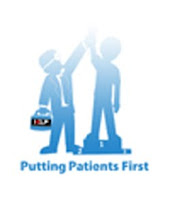Times Wellness
Telephonic troubles
Sunday, August 17, 2008
Learning the right way to communicate with your doctor over the telephone is an important etiquette every patient should know
Dr Aniruddha Malpani
Often you can save yourself a long wait for the doctor at the clinic by getting advice on the telephone. Such a trend is becoming increasingly important today, when time is at a premium and commuting is so arduous, thanks to frequent traffic jams. You need to learn to make intelligent use of the phone to get appropriate help from the doctor. However, when you're sick or hurt, it becomes difficult to think clearly and the following routine may help get the necessary care you need over the telephone:
· Keep a pen and paper ready so that you can write down the relevant instructions.
· Make sure all your medical records are at hand, so that you can answer questions about your medical problem intelligently and accurately.
· Identify yourself properly, giving your full name as well as your diagnosis. Avoid taxing your doctor's memory.
· Respect your doctor's time. Don't insist on talking only to the doctor every time you call. For example, if you just need to make an appointment, or merely clarify a doubt, the nursing staff or receptionist may be able to help you.
· When you don't know what you need (for example, you may not be sure how serious the illness is and whether you require to visit the clinic), tell the staff you're uncertain and request that you speak to a nurse or the doctor's assistant over the phone. If you're feeling concerned or anxious, let the clinic staff know.
· Ask if you can take a few minutes of the doctor's time now, or whether you should call back again later – this is common courtesy.
· Report specific symptoms. For example, rather than just saying, 'I don't feel well, or I've got the flu,' which can be interpreted in different ways, be prepared to describe your symptoms precisely; for instance, fever, sore throat, cough, and/or bodyache. Similarly, instead of just saying, 'my baby has a fever', specify the exact temperature and the duration of the fever as well as other signs or symptoms.
· Don't misuse the phone by trying to wangle a free consultation. Not only is this unfair to the doctor, but also such a consultation is likely to be very unreliable.
· Ask the doctor what you should do and write down his instructions carefully. Ask the doctor to spell out any word if you are unsure about it.
· Ask if and when you should call back, or if you should come to the clinic.
· Ascertain what complications could occur that may require you to hurry to the emergency room.
· Don't forget to thank the doctor for talking to you on the telephone!
If you have the doctor’s mobile number or residence number, please treat with respect. This is a privilege he has granted you, so don’t abuse it for routine calls, which are better handled by calling the clinic or the secretary.
It’s a good idea to find out what the clinic policy is about phone calls in advance.
· When is the best time to call?
· What is the doctor's rule for returning calls?
· Whom should you speak with (e.g., assistant, nurse) if the doctor can't come to the phone?
· What is the phone number for making emergency calls or for calls when the office is closed?
· Whom can you call if your doctor is out of town?
Sometimes, you may have to call a doctor after the clinic has been closed. Remember when you call a doctor after hours, he is trying to help you solve your immediate problem, not provide advice about your entire medical situation. Try to be specific in your complaint; you should know what medications you are currently taking and which of them has proved successful in the past. If you are not happy with the physician's advice or if you feel you are getting worse, go to the nearest emergency room at once.
Let me give an example of a precise and useful telephone call: 'I am an asthma patient and have had increasing wheezing today. I am not coughing up any mucus. I am using my albuterol inhaler every three hours but it doesn't seem to work. Last year when I suffered a similar episode, the doctor gave me prednisone and it worked, but the prescription is a year old. What should I do now?
On the contrary, here is an example of a bad telephone call: 'I don't feel good. The doctor treats me for breathing problem. I take three breathing pills, one is green, one is white and one is real, and I ran out of the red one last week. While I have you on the phone, I think I have a fungus on my feet, can you suggest a prescription for something for that as well….'
Making effective use of the telephone can help to save both your doctor’s and your time, effort and money. Learn to use this instrument wisely and well.
Personally, I prefer email to talking to patients on the phone for many reasons.
· Everything is documented
· There is no scope for confusion or misunderstanding
· I can refer to the patient’s medical records, to ensure my advise is correct
· We don’t have to play telephone tag, which means I can answer at my own convenience. This is especially important for overseas patients, because of the timezone differences
Smart patients need to learn how to communicate with their doctors – and using the phone and email effectively can help them they save the doctor’s time, as well as their own.
Subscribe to:
Post Comments (Atom)



No comments:
Post a Comment